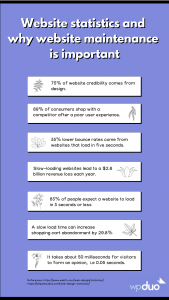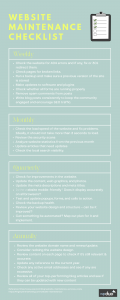
What Does a Website Maintenance Plan Look Like?
The 2000s were simpler times. The ability to create spreadsheets was enough to impress people, Keeping Up With the Kardashians wasn’t a thing yet, and to the layman, spam was just food. And here we are in 2021, where a simple google search about your common cold symptoms can convince you that you have terminal cancer.
Humanity has come a long way, and so have websites. A few years ago, a webpage with “Hello World” in hyperlinked blue font, going from the left to right and back, was enough for it to be called a website.
Now, the average number of objects on a webpage is 112, and the number is constantly growing. For obvious reasons, the higher the number of pages, and subsequently the objects on those pages, the more complicated it is to manage and maintain the website.
Website maintenance, essentially, is checking whether your website functions optimally. “Optimally” being the keyword here. (Just because your website takes the user where they click and doesn’t spiral out of control when asked to do more than 2 things, doesn’t mean your website works optimally. It just means it works.)
So why is website maintenance such a big deal?
For starters, 94% of first impressions relate to your site’s web design and 47% of Users expect a maximum of 2 seconds loading time. On average, slow-loading websites cost retailers $2.6 billion in lost sales each year. This implies that if your website is clunky, hard to figure out, takes-forever-to-load, and includes broken links, you’re losing a customer each time you blink.

Strategically, this is why website maintenance is important:
- SEO Strategy Support – There are websites that just look like trouble waiting to happen. They have too many pop-ups, designed in a way that makes it look like a second grader made it, and an overall unfortunate look that screams “I WILL STEAL YOUR DATA”. The bounce rate can affect your search result rankings, and a website management plan can help you understand why your users leave after visiting your website. Website maintenance helps you fix your data security and technical issues that contribute to poor SEO.
- Security – If you and your customers are one of those people that hand out their social security numbers to anyone who asks, security may not be important to you. The rest of us would like our organs in our bodies and not on sale on the dark web. A quick search on HaveIBeenPwned can tell your customers if their data has been compromised, and you really wouldn’t want your business to end up on that list. Moreover, 43% of all cyberattacks are aimed at small businesses, but only 14% are prepared to defend themselves. One compromised link holds the power to wipe out your entire business, but efficient website maintenance will prevent this from happening.
- First Impressions Matter – Hate to break it to you, but you only get 2 seconds before a potential customer leaves your site and switches to a competitor. If they’re a repeat buyer, you might get 3. In your audience’s head, a bad website equals bad service. 88% of online consumers are less likely to return to a site after a bad experience and a broken link is all it takes to make it a reality. Accurate website maintenance will not let that happen.
- Fixing Issues: Website maintenance takes care of broken links, takes-forever-to-load-kinda images, or the worst, bugs. You value website maintenance on the days when the website is down and you don’t have to wait while customer care has you on hold for the 8th time that morning.
- Grow With Your Company: To put it simply, having a website maintenance plan means you get to focus on your business and someone else will happily do the rest for you. When your website crashes, your business doesn’t have to. wpDuo communicates through email, so an issue that usually takes an hour to fix can be fixed in less than 10 minutes. With a website maintenance plan, your website grows as your business does.

All in all, maintaining your website can be a hassle, especially if you have to look out for multiple things at a time. Here’s a weekly, monthly, quarterly, and yearly checklist for the same:
Website maintenance is a loop, not a checklist. You may be tech-savvy enough to fix a few bugs here and there, but you need an expert to take care of all the “behind-the-scenes” things. Unless of course, you plan on spending all your time fixing and updating your website instead of running your business. Running a small business is one thing, overestimating what you can do and micromanaging everything is another.
Here’s what a WordPress maintenance plan can do for you:
- Staging Environments: Trying out new themes and plugins can be a hassle if you have to shut down your entire site to make a minor update or run a few tests. Managed WordPress hosting makes it possible for your developer to make an exact copy of your website and run the tests there, i.e on the development site with a single click. This way, the changes are not reflected on the production site, and all updates from the dev site can be migrated back to the production site from the dashboard.
- Automatic Backups: With WordPress maintenance, you don’t have to worry about losing all your data. Most WordPress maintenance plans offer both automatic and manual updates with easy restoration.
- Premium Support: No one likes making a call to customer support, definitely not on a Monday morning when the site has crashed and you have to wait online for what feels like an eternity. With WordPress maintenance, your website is monitored for issues and often resolved without your involvement. In the event there’s more that needs attention, you can get ahold of someone who can help, any time of the day. Also, managed WordPress hosting makes it possible to make layout changes to the website, adding functions and features, things that are usually not accessible to the typical user.
- Security: When you use a DIY way to host your website, which is typically shared hosting, another website’s security breach can quickly become your problem. In scenarios like this, there is often no support or assistance, meaning you’re pretty much on your own. However, with any sort of website maintenance plan, especially the WordPress maintenance one, you can be assured that these malware attacks are not just solved, but also prevented.
- Speed: WordPress offers caching plugins, but since managed WordPress hosting does that for you, you don’t have to worry about which one works best. Caching plugins can be complicated and difficult to deal with, making the entire process so not fun. Managed WordPress hosting can get everything done faster, not just in regards to how fast your website loads but also how fast your website issues get fixed.
- Setup and Updates: Most WordPress maintenance plans (like wpDuo) offer an easy setup and 100% free migration. Talk about making things easy! Updates with managed WordPress hosting plans are a breeze. WordPress itself has an automatic update feature, but managed hosting makes it possible for the security fixes to be implemented as soon as they come out, preventing any security attacks on your website.
Pros and cons of website maintenance:
Website maintenance doesn’t just help your website function, but in some cases, also helps it run better. In addition to the featured pros above, here are some other advantages to website maintenance.
- Improving Customer Experience: In 2016, 89% of companies hoped to compete through customer experience in comparison to just 36% in 2010. Imagine the figures in 2021! Now, I don’t know about you, but pop-ups every 5 seconds and broken links every time someone clicks on your website don’t sound pleasant to me. Just think about it, if you visited a physical store and they jump-scared you every 5 seconds saying, “SALE”; it really wouldn’t make you think, “wow”, would it? The same thing applies to your website. A website maintenance plan can get rid of the annoying functions and replace them with better-suited ones that make your website more welcoming and less spammy.

- Cost: On average, the cost for a website maintenance service for a small business is anywhere between $35-$350/month depending on the domain name, hosting, updates, marketing, backups, content & design. If you choose to go the DIY way and end up stuck in a rut, a freelance web developer would charge you anywhere from $75-$200+/hour. Unless you’re sure of your website encountering issues that take exactly 3 hours or less of work to fix every single month (in which case you’re a genius and don’t need a web developer), having a website maintenance plan is just a lot more cost-effective.
- Business Reputation: Your website is often the first point of contact between you and your audience. An outdated and hard-to-use website is the last thing your audience needs to navigate. If you have a bad website, refuse to pay for a website maintenance plan, and are having to pay a lot of money for quick fixes, you’re spending more money on the website than it will ever make you back. Invest in website maintenance and make sure your reputation stays positive with your customers.
- SEO: Great website maintenance drives traffic to your website by taking care of caching, which in turn affects speed and ultimately affects SEO. Also, websites that take longer to load, no matter how good they are, are penalized in rankings. A website that loads fast, doesn’t have broken links, is not susceptible to cyberattacks, and has an overall good UI wins in the long run. Website maintenance is not just about money, it’s also about your time and sanity.
The pros may overpower the cons, but apart from the obvious ones like cost, here are a few things you need to bear in mind before you choose a WordPress/website maintenance plan:
- Specialization: Although working with a service that understands your needs and the WordPress environment in general, is the cherry on top, some of us just don’t like cherries. Maybe your website is not a WordPress-hosted website, and you plan on keeping it that way. In such a scenario, finding a specialized website maintenance service can be toilsome.
However, wpDuo can help. If you like the idea of owning your own site, and making maintenance easy with WordPress, wpDuo can easily convert Wix & static HTML sites to WordPress, ensuring long-term ownership and performance of your website.
- Cost: If you’re a small business with a techie on the team, you might want to reconsider outsourcing website maintenance. If you or someone on your team can handle website maintenance efficiently, that can save you about $100-$150 in using an external vendor. However, DIY implies using common setups like Digital Ocean, Linode, or Vultr VPS, apt for someone with web development experience looking to scale on a budget, not shared WordPress hosting, because that would be the worst way to go about it.
Website Maintenance can Benefit Most Businesses
The pros and cons listed above can help you determine if you really need a website maintenance service. If you fit the profile below, you probably need one:
- Small business owner
- Could benefit from a faster and better website
- Wants to prevent possible security issues
- Doesn’t have a developer on the team
- Needs assistance keeping the site up to date
- Values their time and working on their business rather than in their business
Essentially, a maintenance plan is a must for anyone wanting to scale their business with limited resources on hand and does not want a headache every time they face a tech issue.

Comments are closed.